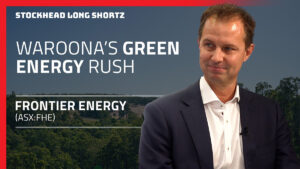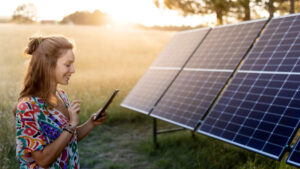Navigating ESG, easy as 1-2-3: How to live and prosper in the resources industry

Here’s a breakdown of what ESG investing is and how you can play the game on the ASX. Pic via Getty Images
Climate change risk, energy markets in turmoil, inflation, and the road to net zero continue to shape the ESG landscape and responsible investment, as evidenced this month at COP28.
While the 28th United Nations climate change conference was perhaps more controversial than ever given it was held in the UAE – one of the world’s largest oil producing countries – it came at a crucial time for the target to limit global temperature rises to 1.5C.
Progress and advancements were made, including 50 of the biggest oil and gas companies committing to reaching net-zero methane emissions by 2030, as well as net zero carbon emissions in their energy use and production by 2050.
These same 50 companies, accounting for 40% of global oil production, also committed to ending flaring – a practice where oil wells burn off accumulated methane rather than capturing it due to regulations and safety concerns – by 2030.
To facilitate this, the World Bank announced the creation of a US$250m trust fund to help companies avoid the practice and the conference closed with an agreement signalling the “beginning of the end” of the fossil fuel era.
This movement towards ‘responsible investing’, a process that acknowledges Environmental, Social, and Governance (ESG) factors in investment decisions, is also taking place on our own shores with the Responsible Investment Benchmark Report valuing Australia’s responsible investment market at $1.3tn in 2022, or 36% of the market.
And while this reflects a 16% drop in numbers from the previous year, the report goes on to say much of this decrease was recovered in the early months of 2023.
The number of fund managers that met the Responsible Investing Association of Australasia (RIAA’s) responsible investment threshold also rose, increasing from 74 in 2021 to 77 in 2022, showing an overall strengthening of approaches to responsible investment by more market participants.
What is ESG investing?
In a nutshell, ESG investing is a broad term which can refer to different ways of incorporating environmental, social and governance issues into the investment process.
As Emilie O’Neill, co-head of ESG at Perennial Partners puts it, the expression can include engagement with companies on material ESG risks and opportunities, and/or financial analysis of ESG into the price target, as well as financial modelling of an investment opportunity.
“It can also extend to investing in companies set to benefit from environmental or social themes,” she says.
“Typically, the types of ESG investing are broken down into the following areas – positive screening, negative screening, portfolio tilt, ESG integration, stewardship, activist and sustainable themes like renewable energy, low carbon technology, and water management, just to name a few.”
How to play the ESG game on the ASX
For investors looking to play the space, O’Neill says there’s a variety of funds on the Australian market that use one or more ESG strategies in their investment process.
Some examples include the Vanguard Ethically Conscious International Shares Index ETF (ASX:VESG), and BetaShares Global Sustainability Leaders ETF (ASX:ETHI).
There’s also the Perennial Better Future portfolio under the code ‘ASX:IMPQ’ which O’Neill says targets companies with operations in healthcare, education, renewable energy, low carbon technology, water management, environmental services and improving social welfare.
“These are the sectors that we believe will benefit from sustainability headwinds particularly evident in global climate policy, with the greatest impact on sustainable industries stemming from government initiatives,” she says.
“Additionally, healthcare stocks are a critical component of our ESG-focused portfolio.
“These stocks, many of which have global reach, have the potential to generate attractive returns while shaping a better healthcare outcome for patients – a critical ingredient in making a positive contribution to society.”
There’s only one pure play ESG stock
Founded in 1986 and listed in 2002, Australian Ethical Investment (ASX:AEF) is currently the only pure play stock offering exposure to ESG.
The company’s investment approach is heavily weighted towards Australian small caps with a focus on the healthcare and technology sectors.
In a previous interview with Stockhead, AEF chair Steve Gibbs labelled gambling, fossil fuels, and the bulk of the mining sector as areas it did not invest in, though admitted to the interpretation being flexible enough to change slightly over time.
For example, the fund has exposure to lithium, given its importance in the construction of storage batteries, via investments in Allkem (ASX:AKE), IGO (ASX:IGO) and Pilbara Minerals (ASX:PLS).
Seneca’s renewable energy stock pick
Seneca Financial Solutions is an Australian boutique investment and private wealth advisory company.
As the trusted financial advisor to some of Australia’s most successful families, professionals, and business owners, Seneca is very selective in what it does.
When it comes to ESG investing on the ASX, Seneca CEO Luke Laretive tells Stockhead the ETFs and managed funds operating with an ‘ESG’ designation of some sort tend to focus on ‘harm avoidance’, which is a negative screen.
“But there are a few companies listed on the ASX that are working positively to progress towards carbon neutrality or address equality and diverse representation,” he says.
“And a small subset of those few are viable investments from which we could reasonably expect to generate positive financial returns.
“One of those unique companies is Vulcan Energy Resources (ASX: VUL) which is constructing a carbon-neutral lithium project in Germany.
“Once in production in 2026, VUL will supply ethically-sourced lithium to the electric vehicle industry and further assist in decarbonising the transport industry.”
Unlike other miners trying to set up critical mineral projects in Europe, Vulcan has faced no pushback in Germany where its Zero Carbon Lithium projects seeks to provide an answer to where sustainable production of critical minerals will come from in the future.
Last week, the Landau City Council formally approved the construction of the geothermal renewable energy and lithium extraction plant (G-LEP) and, following satisfaction of conditions, the right to acquire the land which is within the planned Landau commercial park “Am Messegelände Südost”.
This demonstrates the strong support by the City of Landau, given the project’s local social and environmental benefits which include producing renewable heat and power as well as enough lithium hydroxide for ~500,000 battery electric vehicles each year.
Vulcan Energy Resources share price today:
Related Topics
UNLOCK INSIGHTS
Discover the untold stories of emerging ASX stocks.
Daily news and expert analysis, it's free to subscribe.
By proceeding, you confirm you understand that we handle personal information in accordance with our Privacy Policy.








